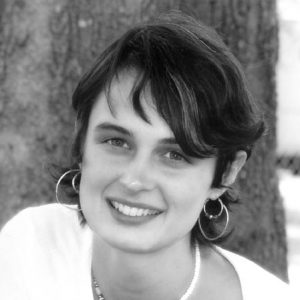calsfoundation@cals.org
Julia Lorraine "Butterfly" Hill (1974–)
Julia Lorraine “Butterfly” Hill is an environmentalist, poet, writer, educator, speaker, and founder of the organization Circle of Life. She earned international fame as an environmental activist by protecting an old-growth forest in northern California from clear-cutting by a logging company. To prevent the logging, she lived in one of the trees—a 1,000-year-old redwood known as “Luna”—for 738 days until an agreement was reached with the Pacific Lumber Company.
Julia Butterfly Hill was born on February 18, 1974, in Mount Vernon, Missouri, to Dale Edward Hill, a traveling minister, and Kathleen Anne DelGallo; she has two brothers. Her parents later divorced. Until she was ten, Hill lived in Harrisburg, Pennsylvania, where her parents had started a church called Freedom Chapel. Entering a private school in Harrisburg at age five, she completed first and second grade. She was home schooled in grades three through eight. From age eight until twelve, she lived in a thirty-foot camping trailer during her parents’ itinerant ministry. When she was twelve, her family settled in Jonesboro (Craighead County), where she attended high school until 1990. She graduated in 1991 after completing a remaining half-credit in English through correspondence.
At age sixteen, Hill was employed in various jobs—fast food, retail, and factory—working as much as ninety hours a week before entering college at Arkansas State University (ASU). When she was eighteen, she and her father founded and operated Relics, a restaurant and club in downtown Jonesboro that featured a stage with live music, poetry, and plays.
At age twenty, Hill moved to Fayetteville (Washington County), living there for two years and working in the restaurant and bar industry. In August 1996, she was involved in an auto accident resulting in very serious injuries and requiring ten months of physical and cognitive therapy. Hill credits the accident with helping her discover her calling in life. In June 1997, she left with friends to see the rain forests of the Pacific Coast. While visiting the redwood forest around Grizzly Creek State Park, she was so moved that she resolved to fight for their preservation.
In November 1997, she made contact with environmental activists in Humboldt County, California, who were conducting a “tree sit,” a non-violent method of civil disobedience that involves perching high in a tree in order to protect it and the surrounding trees from logging. Tree sitters worked in shifts of several days; her first time, she sat for six days on a six-by-eight foot platform 180 feet up a 200-foot, 1,000-year-old redwood known as Luna. Since many of the activists went by “forest names,” she gave herself the name “Butterfly.”
By December 1997, the logging operation was closing in on Luna. Hill ascended the tree and began a stint that lasted more than two years and entailed enduring not only illness and the forces of nature but also the efforts of Pacific Lumber to bring her down: floodlights, air horns, blockading from supplies, and even a professional climber sent to force her down. She established the longest activist “tree sit” in the world, the prior record having been ninety days in England. Eventually a legal agreement was reached that provided for the preservation of Luna and all the trees within the three acres surrounding it; in return, Pacific Lumber received a $50,000 payment that was provided by Hill, with the stipulation that it be donated to a local college, Humboldt State University.
She founded Circle of Life, an organization devoted to environmental education and activism, in early 2000 while still sitting in Luna. Her autobiographical account of the tree sitting, The Legacy of Luna, was published in 2000 and was well received by an international audience. She also co-authored One Makes a Difference: Inspiring Actions that Change Our World and self-published a book of writings and artwork called Becoming.
As an anti-war activist, Hill helped shut down San Francisco’s financial district before the invasion of Iraq in 2003. She was arrested and forcibly deported from Ecuador in July 2002 due to her solidarity activism on behalf of the indigenous population displaced by the nation’s oil development.
Hill is the youngest person ever elected to the Ecology Hall of Fame and was named by John F. Kennedy Jr., in George magazine, as one of the twenty most influential women in politics. She lives in Oakland, California.
For additional information:
Fitzgerald, Dawn. Julia Butterfly Hill. Minneapolis: Millbrook Press, 2002.
Goodman, Leslee. “The Butterfly Effect: Julia Butterfly Hill on Activism, Tax Resistance, and What She Learned from a Thousand-Year-Old Redwood.” Sun (April 2012). Online at https://www.thesunmagazine.org/issues/436/the-butterfly-effect (accessed September 27, 2022).
Hill, Julia Butterfly. The Legacy of Luna: The Story of a Tree, a Woman, and the Struggle to Save the Redwoods. San Francisco: HarperSanFrancisco, 2000.
Hill, Julia, and Jessica Hurley. One Makes a Difference: Inspiring Actions that Change Our World. New York: HarperCollins, 2002.
Julia Butterfly Hill. https://www.juliabutterflyhill.com/ (accessed September 27, 2022).
Toms, Michael, with Julia Butterfly Hill. The Heart of a Heroine. Audiobook. Carlsbad, CA: Hay House, 2000.
Wolens, Doug, director. Butterfly. VHS. 2000.
Robert Lamm
Arkansas State University
 Divergent Prosperity and the Arc of Reform, 1968–2022
Divergent Prosperity and the Arc of Reform, 1968–2022 Julia Butterfly Hill
Julia Butterfly Hill 



Julia Butterfly Hill was about seven or eight when she received the nickname Butterfly. She and her family were hiking one day when a butterfly landed on Julia’s finger, and it stayed there through the whole hike.
I am taking environmental science right now, and I am doing a report on Julia.